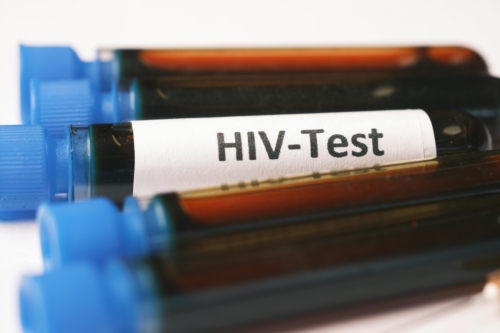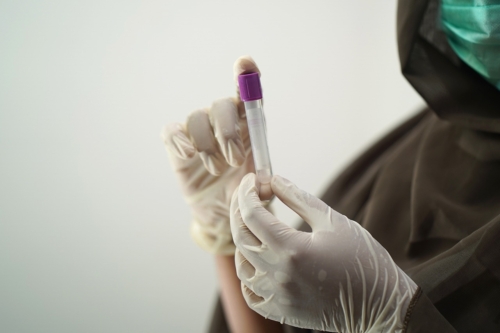
A man was given a three-year suspended prison sentence for deliberately infecting his partner with HIV.
It was established that the accused committed the crime of gender violence. Knowing that he was a carrier of the virus, he did not take precautions to prevent his partner from becoming infected while they were in a relationship.
A 56-year-old man was given a three-year suspended prison sentence for gender violence, accused of having infected his partner with HIV knowing that he was a carrier of the virus. The sentence also includes a civil reparation for the damage caused to the victim, in the amount of 40 thousand dollars.
The investigation carried out by the PCyF Prosecutor’s Office No. 36 specialising in Gender Violence, led by Adrián Dávila, established that the accused, knowing of his illness, did not take precautions to avoid infecting his partner while they were in a relationship. Furthermore, as a result of the contagion, he is accused of having caused a permanent weakening of her health, with a global affectation of her quality of life.
The decision of the city court – thefirst recorded for this crime – approved the settlement agreement reached between the parties, by which the accused was sentenced to 3 years suspended imprisonment.
In addition, rules of conduct were established as rules of conduct for a period of 3 years, the abstention of contact with the victim by any means; the performance of 80 hours of public utility tasks in the Caritas Foundation- in an entity related to the study of HIV; the obligation to attend a workshop on Gender Violence; as well as to establish residence and notify any change.
The case began with the victim’s complaint after learning of her condition. It caused a thrombosis that turned into a lifelong necrosis – death of body tissue – in the iliac and femoral veins and permanent oedematisation of her left leg. All this, with the risk of life-threatening thrombosis, added to the certain and imminent risk of contracting other diseases due to her being immunosuppressed.
The prosecution’s investigation gathered various evidence, such as medical analyses and testimonies, which allowed them to establish that the accused became aware of her illness in March 2013. Likewise, the couple’s relationship with the victim lasted from 2011 to 2016, during which time they had sexual relations without any kind of prophylaxis to prevent the transmission of diseases, showing that the man did not take any precautions to prevent her from becoming infected through sexual transmission.
The infection caused the victim’s mental health to be affected by post-traumatic stress disorder and mood disorder, derived from the whole situation suffered due to the HIV infection.
In view of this, the prosecution charged him with the crime of contracting a sexually transmitted disease, together with ‘serious and very serious injuries, aggravated by the link and gender’. Finally, following a plea agreement approved by Judge Fernanda Botana of Court 5, he was sentenced to a suspended sentence of three years.
According to statistics, there are more than 140,000 people in Argentina with the human immunodeficiency virus (HIV), although 13 per cent of them do not know it, and 98 per cent of them are infected through unprotected sexual intercourse. Among cis men, 64 percent are infected during sex with other men and 34 percent during sex with cis women. HIV in Argentina is a concentrated epidemic with higher than average prevalence in some key groups, such as transgender women, men who have sex with men and sex workers.
An average of 5,300 new cases are reported each year: 69% of cis men are diagnosed with HIV with a median age of 32 years, while cis women represent 29% with a median age of 35 years. The mortality rate due to HIV-associated pathologies, although it has changed significantly over the last 10 years, continues to decline.
Condenaron a un hombre a tres años de prisión en suspenso por contagiar adrede de HIV a su pareja
Se logró establecer que el imputado incurrió en el delito de violencia de género. En conocimiento de ser portador del virus, no tomó recaudos para evitar que su pareja se contagie mientras mantuvieron un vínculo
Un hombre de de 56 años fue condenado a la pena de tres años de prisión en suspenso por violencia de género, acusado de haber contagiado a su pareja con HIV a sabiendas que era un portador del virus. La condena implica también una reparación civil del daño causado a la víctima, a la suma de 40 mil dólares.
La investigación llevada adelante por la Fiscalía PCyF Nº 36 especializada en Violencia de Género, a cargo Adrián Dávila, logró establecer que el imputado, en conocimiento de su enfermedad, no tomó recaudos para evitar contagiar a su pareja mientras mantuvieron un vínculo. Además, a raíz del contagio, se le atribuye haberle provocado un debilitamiento permanente para su salud, con afectación global de su calidad de vida.
El fallo de la Justicia de la ciudad –el primero registrado para este delito- homologó el acuerdo de avenimiento alcanzado entre las partes, por el que se condenó al imputado a la pena de 3 años de prisión en suspenso.
Además, se establecieron como reglas de conducta por el plazo de 3 años la abstención de contacto con la víctima por cualquier medio; la realización de 80 horas de tareas de utilidad pública en la Fundación Cáritas –en una entidad relacionada con el estudio del HIV-; la obligatoriedad de realizar un taller sobre Violencia de Género; así como fijar residencia y notificar cualquier cambio.
El caso se inició con la denuncia de la víctima luego de tomar conocimiento de su afección. La misma le provocó unatrombosis que se transformó en una necrosis -muerte del tejido corporal- de por vida, en las venas ilíaca y femoral y una edematización, también permanente, de su pierna izquierda. Todo esto, con riesgo de vida ante una nueva trombosis, sumado al riesgo cierto e inminente de contraer otras enfermedades por estar inmunosuprimida.
La investigación de la fiscalía recolectó diversas pruebas, como análisis médicos y testimonios, que permitieron establecer que el imputado tomó conocimiento de su enfermedad en marzo de 2013. Asimismo, la relación de pareja con la víctima se mantuvo entre los años 2011 y 2016, lapso en el cual mantuvieron relaciones sexuales sin ningún tipo de profilaxis para evitar la transmisión de enfermedades, evidenciando que el hombre no tomó recaudo alguno para impedir su contagio por transmisión sexual.
El contagio a la víctima le provocó una afección en su salud mental por trastorno de estrés postraumático y del estado del ánimo, derivado de toda la situación sufrida por el contagio de HIV.
Frente a ello, la fiscalía le imputó el delito de contagio de una enfermedad de transmisión sexual, junto a “lesiones graves y gravísimas, agravadas por el vínculo y el género”. Finalmente, tras el acuerdo de avenimiento homologado por la jueza Fernanda Botana, del juzgado 5, se lo condenó a la pena de tres años en suspenso.
De acuerdo a las estadísticas, en Argentina son más de 140 mil las personas con el virus de inmunodeficiencia humana (VIH), aunque un 13 por ciento de ellas lo desconoce.Con un 98 por ciento, la principal vía de transmisión del VIH son las relaciones sexuales sin protección. Entre los varones cis, el 64 % se infecta durante prácticas sexuales con otros varones y el 34 % durante relaciones sexuales con mujeres cis. El VIH en Argentina es una epidemia concentrada con prevalencias mayores al promedio en algunos grupos clave, como las mujeres trans, los varones que tienen sexo con otros varones y las y los trabajadores sexuales.
Por año se notifican un promedio de 5.300 casos nuevos: se diganostican un 69% de varones cis con VIH con una mediana de edad de 32 años, mientras que las mujeres cis representan el 29% con una mediana de 35 años. La tasa de mortalidad por patologías asociadas al VIH, si bien tuvo importantes cambios en los últimos 10 años, continúa con tendencia al descenso.




